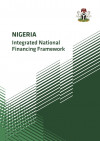Nigeria’s fast-growing economy suffered a significant setback when crude oil prices crashed in early 2016. As a result, government funds for financing sustainable development initiatives, like the SDGs, decreased. Covid-19 compounded Nigeria’s socio-economic situation.
Despite these challenges, the Government of Nigeria remained resolute in its desire to achieve economic growth and development, making strenuous efforts to contain the pandemic and enact policy reforms.
In line with this commitment and with a focus on the 2021-2025 National Development Plan, the government, with support from the United Nations Development Programme, began developing an integrated national financing framework (INFF) to improve SDG financing without increasing public debt.
This financing strategy, a building block of the INFF, builds on an earlier exploration of financing sources and provides recommendations on how best to expand development financing through key strategic reforms covering public and private finance.
With its vibrant public and private sectors, international stakeholders and a solid action plan, the government’s commitment to meeting the financing needs of the National Development Plan and the SDGs by 2030 remains strong.
The financing strategy is backed by a Medium-Term Revenue Strategy and a Medium-Term Expenditure Framework. It is further supported by a clear roadmap, a monitoring framework and guidance on governance and coordination mechanisms to provide the necessary transparency and accountability to ensure the INFF’s success.
As a champion of the INFF process, Nigeria hopes to provide peer countries with a robust example of a financing framework that aligns policies with sustainable development and fosters an enabling environment for domestic, international, public and private actors to best respond to national needs.
